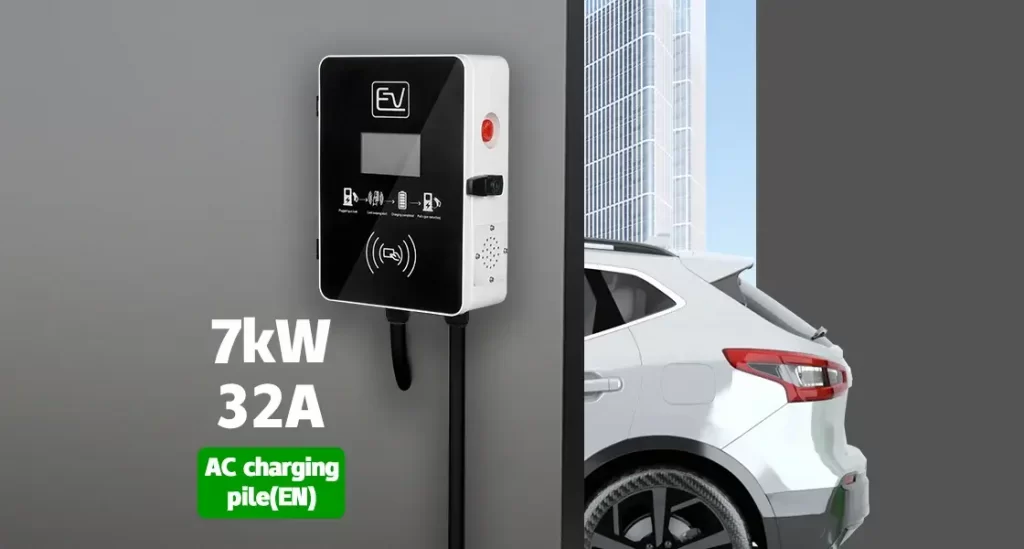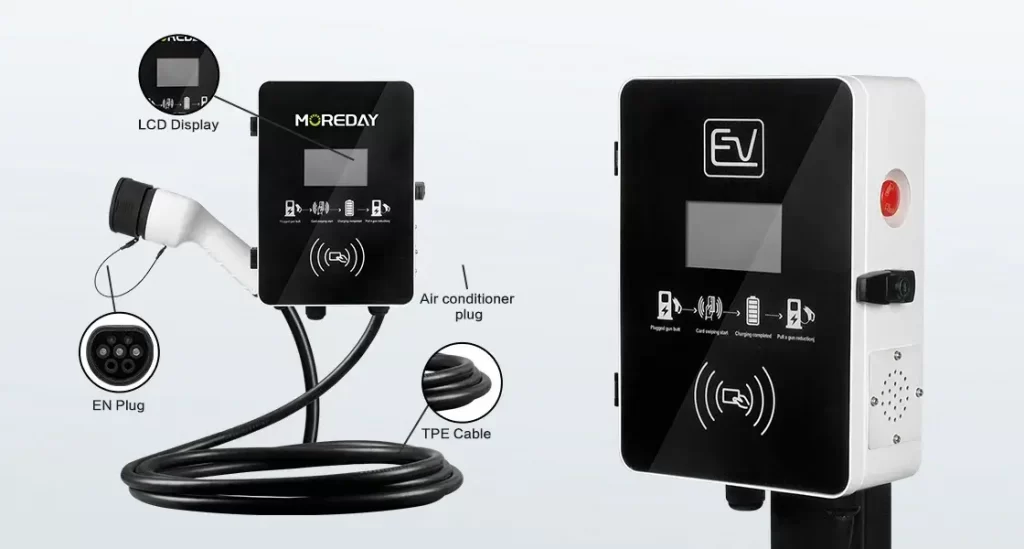Electric vehicles (EVs) have become popular. in 2023, EV sales grew about 48% from the previous year to a record 1.2 million units sold. More than 80% of EV drivers prefer to charge at home overnight.
The cost of installing a home charger can range from a few hundred to a few thousand dollars, a price range that is largely influenced by factors such as the type of EV charger, required electrical upgrades, labor costs, and required permits and inspection fees.
This article will take an in-depth look at the expected cost of installing an EV charger at home, including the price of different levels of chargers, installation costs, and other factors that may affect the total cost to help owners make an informed financial decision.
Table of Contents
ToggleTypes of EV Chargers

There are three main types of EV Chargers, including Level 1, Level 2, and Level 3 EV Chargers. Let us explore the definitions of these three types of EV Chargers.
1. Level 1 Chargers
Level 1 chargers offer a basic electric vehicle charging option that works by plugging into a standard 120-volt household outlet. This type of charger has a slower charging rate, making it ideal for users who don’t regularly drive long distances.
Because the installation process is simple and requires no special equipment or electrical work, Level 1 chargers are the most convenient and cost-effective option for home use.
2. Level 2 chargers
Level 2 chargers charge faster than Level 1 chargers. These chargers use a 240-volt outlet, similar to those used for larger appliances such as dryers.
2-stage chargers are ideal for everyday use and offer a practical solution for nighttime charging. Many Level 2 chargers have smart features that allow for remote control and monitoring via a smartphone app. This helps to manage charging times and optimize energy use.
A dedicated 240-volt circuit is required to install a Level 2 charger. If this circuitry is not already installed, an electrician will need to install it. The installation process includes mounting the charger on a wall or base. This setup provides a reliable and efficient charging solution for home use.
3. Level 3 Charger (DC Fast Charger)
Level 3 chargers, also known as DC fast chargers, offer the fastest charging speeds. These chargers can charge an electric vehicle to 80% or more in as little as 20-30 minutes. Level 3 chargers are typically located at public charging stations. They require specialized infrastructure and a high-voltage direct current (DC) power supply.
It is not feasible to install Level 3 chargers in a residential environment. These chargers require complex setups and high-voltage DC power sources that are not available in most homes. level 3 chargers are best suited for commercial locations and public charging stations.
How much does it cost to install an EV charger at home?
The total cost of a home charging station is affected by several factors, primarily the choice of charger, installation costs, possible upgrades to the electrical system, and associated permitting and inspection fees.
- Level 1 chargers typically cost between $200 and $500 and use a standard 120-volt outlet.
- Level 2 chargers, which require a 240-volt power source, cost between $500 and $2,000, and installation costs can range from a few hundred to a few thousand dollars, depending on the complexity of the installation and the proximity to the power source.
- If a home’s existing electrical system does not support the additional charging needs, an electrical upgrade may be required, costing from $1,000 to $3,000. Also, depending on the area, permit and inspection fees of $100 to $500 may be required.
Understanding these costs can help vehicle owners make smarter budget planning when installing a charging station while taking advantage of any available government subsidies or tax incentives can also be effective in reducing costs.
Factors Affecting Installation Costs

1. Charger type
Level 1 chargers use standard household outlets and are less expensive and suitable for occasional use. In contrast, Level 2 chargers require a dedicated 240-volt circuit and provide faster charging, but are more costly to install.
Level 3 chargers or DC fast chargers charge the fastest but are generally not suitable for home use due to their costly installation and infrastructure requirements.
2. Electrical Upgrades
If the existing circuitry cannot support the additional load, it may be necessary to upgrade the electrical panel and add new wiring. The complexity and cost of installation will vary depending on the layout of the home.
3. Labor Costs
Installation should be completed by a professional electrician to ensure safety and compliance. Costs will vary depending on the complexity of the job and the area in which it is located.
4. Permits and Inspections
The installation process requires the appropriate permits and inspections to ensure compliance with local safety standards. These costs typically range from $50 to $200, depending on the area.
Understanding these costs will help you effectively budget for your EV charger installation. Proper permits and inspections not only ensure safety but also compliance with local codes.
How can I reduce the cost of installing an EV charging station?

While installing an electric vehicle charger at home can provide many benefits, effectively managing the cost of installation is also an important consideration. Here are some strategies to help you reduce the cost of installing an electric vehicle charging station at home:
1. Choose the right charger model
Avoid over-provisioning by choosing a charger that meets your daily needs. For example, if you don’t drive a lot of miles per day, a Level 1 charger may be sufficient, cost less, and be simpler to install.
2. Conduct your preliminary research
Do some of your research before you buy and install. Learn about different makes and models of chargers and compare their cost-effectiveness. Find out which chargers are easy to install and which may require expensive circuit upgrades.
3. Take advantage of government subsidies and tax credits
Many local governments offer subsidies or tax incentives for installing charging facilities to promote the adoption of electric vehicles. Check for available local subsidies and apply for them to significantly reduce installation costs.
4. Plan your installation
The charger should be located close to an existing electricity supply point, such as your home meter or main distribution panel. This will reduce the length of additional wiring and associated materials used, thus reducing costs.
5. Do-it-yourself or semi-do-it-yourself
If you have basic electrical skills, consider installing the charger yourself, or doing some pre-installation work such as laying wires and preparing mounting points can significantly reduce the cost of a professional installation.
6. Choose the right time for installation
You may get a better deal on service costs by installing the charger during a period of low demand for electricians. Additionally, avoid expedited services; routine installations usually cost less.
7. Compare multiple quotes
Get several quotes from different electricians or installation services and compare their services and costs. Choose a cost-effective service provider but at the same time make sure that their services are of good quality and reputable.
You can consider the Moreday website. They have a dedicated team for their services and have high-quality service quality. Contact them ASAP for a quote!
Summary
In general, the cost of installing a home electric vehicle charging station varies depending on many factors, and if you want to install a Level 2 charger at home, the price cost is generally between $700 and $4500.
The cost difference is mainly determined by the type of charger, the installation work required, whether the electrical system needs to be upgraded, and the associated permitting and inspection fees. Car owners should consider their specific needs, choose the type of charger that is right for them, and consider any possible electrical upgrades.
Related reading: AC VS DC Charging

